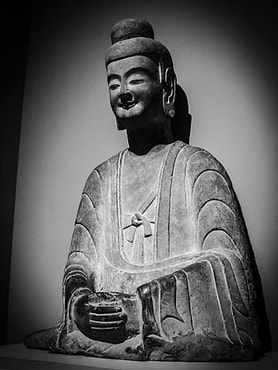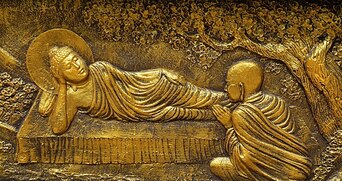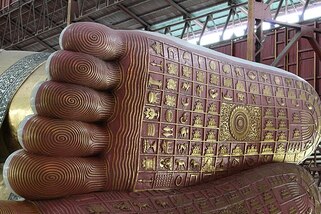|
During what would be his final journey, Gautama Buddha first became ill when he and some of his disciples were staying at Beluva for the rainy season. His pain was very great, but through meditation he was able to endure it, and he made a recovery.
Masters commonly hid the inner secrets of their craft or teachings from their followers. This was termed “the master’s fist.” Gautama Buddha said that in his teachings there was no “master’s fist.” The Buddha believed that these teachings belonged to all people, without regard to caste or other distinctions. Gautama went on to say, “Ānanda, . . . I am old and wasting away with age. I have traversed life’s journey and reached the end of my time. I am already eighty. As an old cart will move only if strapped up, my body is kept going by being strapped up. It is only when . . . [I enter] into the concentration of mind that has no outward characteristics that [my] body is sound.
The word translated as “island” is dīpa. Opinions vary on the translation of this word, which can also have the meaning of “lamp” or “light.” Most evidence indicates that “island” is the intended meaning, based on how those in India depended on islands or sandbars for safety during the floods of the rainy season. Jain writings also contain dīpa in this usage. But an argument can be made for the meaning of a light or lamp, which could be used as a guide; the interpretation would then be “You should be guides unto yourselves.” Shinran, founder of the Jōdo Shin sect of Buddhism, used the word “beacon”; this word suggests a light or lighthouse marking an island, combining the two meanings in a pleasing way.
For Further Exploration:
Quotations of the Buddha are taken from Hajime Nakamura’s work Gotama Buddha: A Biography Based on the Most Reliable Texts, Vol. 2 (Tokyo: Kosei Publishing Co., 2005). The story of Buddha’s decline and death is recorded in the Mahaparinibbana Sutta (Pali version). Many translations exist, but one that is worth checking out is Last Days of the Buddha by Sister Vajira and Francis Story (Sri Lanka: Buddhist Publication Society, 2000). Buddhist scholar Thānissaro Bhikkhu has also translated this sutra. The complete text is available online here. Mary Oliver wrote a poem about the Buddha’s death, making use of some poetic license. It’s titled “The Buddha’s Last Instruction,” and you can read it here.
1 Comment
Teresa
4/28/2022 12:50:56 pm
Enlightening!
Reply
Your comment will be posted after it is approved.
Leave a Reply. |
Categories
All
Archives
January 2024
|



 RSS Feed
RSS Feed